
BIOGRAPHY — UBUZIMA
David Rukashaza was born in Uganda in 1942. His father had moved the family from Byumba (northeast), Rwanda, in pursuit of better living in a period of famines and WWII. David was the youngest of four and was born after many siblings before him had died in their infancy. This explains his given name “Rukashaza,” which means “Death is exaggerating.”
David’s surviving siblings were much older than him, and his sister Mary ended up taking care of him in his youth. They became very close.
David’s surviving siblings were much older than him, and his sister Mary ended up taking care of him in his youth. They became very close.
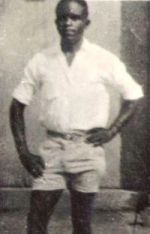
When the family came back from Uganda, they had converted to Christianity as Anglicans. Most schools were Catholic, so his father took him to a Protestant primary school, away from home, where he found a teacher he recruited as a mentor. David lived with this teacher and his family and became one of their children. After primary school, he passed the national exam and got accepted at an Anglican boarding middle school (Gahini). After his three years, he transferred to Shyogwe, focusing on a teaching certificate. In school, he learned that he loved mathematics, singing in the choir, and exploring the unknown. He was very athletic, played soccer, and loved wrestling. He was also known for his sense of humor.
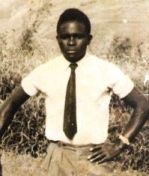
After graduating, he joined his mentor Manasseh as a teacher at Mukono, Byumba, and continued singing in church choirs. While teaching, he read newspapers a lot and found an address for the closest American consulate (Bujumbura). He convinced his mentor and his best friend to help him write a letter to the consul asking for a scholarship to study in the United States. Unexpectedly, he received an invitation for an interview at the consulate in Bujumbura. He walked the 100 miles for his interview, not believing what was happening.
In the meantime, Rwanda was going through a revolution and referendum. During that time, he and the other teachers educated people about the meaning of voting. When Rwanda gained independence on July 1, 1962, he and his friends marched with the students singing songs of glory.
After they had lost all hope about the scholarship, David got a letter and tickets to leave for the United States the next week. He had been granted a scholarship.
In the meantime, Rwanda was going through a revolution and referendum. During that time, he and the other teachers educated people about the meaning of voting. When Rwanda gained independence on July 1, 1962, he and his friends marched with the students singing songs of glory.
After they had lost all hope about the scholarship, David got a letter and tickets to leave for the United States the next week. He had been granted a scholarship.
That night, he walked the 60 miles home to tell his parents and give his good-byes. Because he was the only one who had made it in school, thinking that he could make it even further was beyond their comprehension. He received his mother’s blessing, and off he went. He was the first Rwandan to attend college in the United States. He left with no knowledge of English and no notion of what or where he was going. He just knew he was going to see the world and learn more. He was fearful of all the unknown awaiting him, but did not look back.
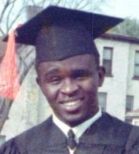
David made it to Pennsylvania where he took English classes, and he started engineering at Ohio State. After transferring to Michigan State and realizing that the big schools did not match his learning methods and interests, he went to Milwaukee School of Engineering (MSOE) where he graduated in electrical engineering.
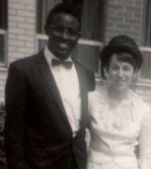
On the social side, every weekend, the Africans would have parties and invite people to dance. He met Rita, his future wife in 1966, when a roommate of his who went to school with her introduced them at one of the parties. They started dating regularly in spring 1966. He gave good advice about the reality of Rwandan life and what it was going to take to adapt to that life. They were both determined to make it work and decided to get married after he graduated. After announcing the engagement to his mentor and to family back in Rwanda, David and Rita were married on a cold January day in 1969.
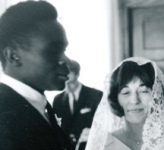
Soon after their marriage, David returned to Rwanda, after being gone seven years. He went back alone to look for a job and a place to live before Rita would join him three months later, in July 1969. David started working in the utility company Regideso (that became Electrogaz) a week after his return. They lived in the capital, Kigali, in state-provided housing where they had their firstborn, Margo.
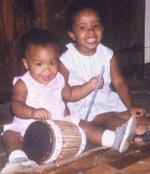
In July 1972, they were transferred to the northwest (Gisenyi) right before their second child, Maria, was born. The family continued to grow, as well as the many friends he made everywhere he went.
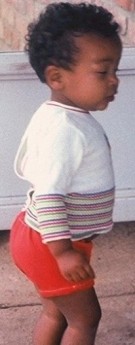
In summer of 1976, after their son was born, the family moved back to Kigali (Gikondo) where he headed the Electrogaz distribution center. David bought land in Gikondo and started building his house. At the same time, he moved his father closer to him because his father was having trouble with the loss of his long-time wife, David's mother. His father lived on the land where David was building. David continued to add houses on the land, building quite a compound that got to be known as “Camp David.” All the houses built on the land were financed without loans. David was the designer and his family members were the helping hands to the mason. All his children and nephews contributed by making bricks, transporting material, painting, roofing, installing electricity, etc. He was always in there doing the same thing; he truly led by example. In fact, many people would come looking for him and ask him where “David” was, because the person they saw with dirt on his legs and hands clearly could not have been the owner of the property, or the man married to an American woman. He always found humor, and great fun dealing with these situations.
David believed in working hard and being creative to reach his goal. He always wanted to attain his goal without needing help from others, which turned out to be a great quality in the different situations he faced.
In 1979, David got transferred to the center of the country (Kigoma, Gitarama), at the central electrical distribution center, and left his family in Kigali where they were getting primary school education and where Rita had a good job. He came home on weekends, and during school breaks the kids would spend time with him in Kigoma. While in Kigoma, David bought land and built more houses. He had found a hobby that was to be his retirement investment as well: building houses and being a landlord.
In 1979, David got transferred to the center of the country (Kigoma, Gitarama), at the central electrical distribution center, and left his family in Kigali where they were getting primary school education and where Rita had a good job. He came home on weekends, and during school breaks the kids would spend time with him in Kigoma. While in Kigoma, David bought land and built more houses. He had found a hobby that was to be his retirement investment as well: building houses and being a landlord.
Throughout the years, and until the end, David’s family raised and hosted many students in order for them to have an opportunity to attend better schools. For him, education was key to better success in the world, and he made sure they all knew that it did not come without hard work and dedication. He corrected them when they were wrong, and he made sure they were on the right path. He was a real father and mentor to hundreds of people.
David was a well-respected man and especially humble. Many people — young and old, rich and poor — came to him for advice, and he loved them all the same, unconditionally. He was extremely generous, but not naïve. He was very diplomatic and respected everybody, no matter what their position in society was. Many times he was offered powerful political positions; he never accepted them because he never wanted to be involved in the malicious practices that came with those positions. It was not about power, and definitely not about material goods. In 1990, the first attacks on the country were in the north of Rwanda, including Byumba, his birthplace. This produced many internal refugees, including his relatives. They lived in refugee camps near Kigali, and those who needed medical and other care lived in his home. At one point, there were more than 30 extra people staying in the house. He went around the country collecting food and clothes that he helped distribute in the refugee camps. During that time, David feared for his family and started petitioning to be retransferred back to Kigali, closer to his family. He finally moved back home in 1992 after 13 years. He worked at the Electrogaz headquarters as an assistant director.
As the instability grew, David felt obligated to protect and care for the 70 people who were on his property. He led the neighborhood watch group to protect the whole surrounding area from the street gangs, just before April 1994. When the genocides started, one of David’s top priorities was to get his family to safety. His two daughters were already in the United States, but he made sure his wife and son were also under US protection. He decided to stay because the rest of the people in “Camp David” were counting on his protection. Also, it was hard for him to leave all he had been working so hard for.
David was a well-respected man and especially humble. Many people — young and old, rich and poor — came to him for advice, and he loved them all the same, unconditionally. He was extremely generous, but not naïve. He was very diplomatic and respected everybody, no matter what their position in society was. Many times he was offered powerful political positions; he never accepted them because he never wanted to be involved in the malicious practices that came with those positions. It was not about power, and definitely not about material goods. In 1990, the first attacks on the country were in the north of Rwanda, including Byumba, his birthplace. This produced many internal refugees, including his relatives. They lived in refugee camps near Kigali, and those who needed medical and other care lived in his home. At one point, there were more than 30 extra people staying in the house. He went around the country collecting food and clothes that he helped distribute in the refugee camps. During that time, David feared for his family and started petitioning to be retransferred back to Kigali, closer to his family. He finally moved back home in 1992 after 13 years. He worked at the Electrogaz headquarters as an assistant director.
As the instability grew, David felt obligated to protect and care for the 70 people who were on his property. He led the neighborhood watch group to protect the whole surrounding area from the street gangs, just before April 1994. When the genocides started, one of David’s top priorities was to get his family to safety. His two daughters were already in the United States, but he made sure his wife and son were also under US protection. He decided to stay because the rest of the people in “Camp David” were counting on his protection. Also, it was hard for him to leave all he had been working so hard for.
David’s diplomatic skills and respect he had gained from all people came into play when he was trying to get the survivors and those he protected to safety. He always protected and felt responsible for those who were less fortunate - that was one of his gifts to this world.
When it was no longer safe to be in Kigali, David moved to Gisenyi, working at the local Electrogaz station while living with his good friend Samson’s family. He continued to find ways to keep people’s minds off the current situation by starting evening gatherings where there were cultural discussions, storytelling, and intellectual games. Everybody, young and old, gathered around him because he always found a way to cheer them up. They were forced to flee to Goma (Zaïre) in June where he and Samson volunteered for UNICEF, helping with the refugees. People would always go to him for moral support and advice in those difficult times.
In July, David got very ill and decided that it was time to get good medical attention for himself. He joined his family in the United States in September 1994, after receiving medical care in Kenya.
When it was no longer safe to be in Kigali, David moved to Gisenyi, working at the local Electrogaz station while living with his good friend Samson’s family. He continued to find ways to keep people’s minds off the current situation by starting evening gatherings where there were cultural discussions, storytelling, and intellectual games. Everybody, young and old, gathered around him because he always found a way to cheer them up. They were forced to flee to Goma (Zaïre) in June where he and Samson volunteered for UNICEF, helping with the refugees. People would always go to him for moral support and advice in those difficult times.
In July, David got very ill and decided that it was time to get good medical attention for himself. He joined his family in the United States in September 1994, after receiving medical care in Kenya.
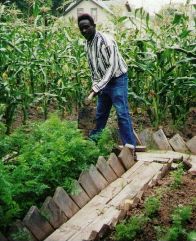
In the US, he realized that he had lost everything in Rwanda and had to start all over again. It was difficult and very disappointing at his age, but he took odd jobs and made numerous friends along the way. He laughed a lot, became an advisor for many, and brought a smile to many people’s faces. Even though he had been a much respected man, with very good standing in the society of Rwanda, he was willing to do jobs that most people would think beneath them. He was a very humble, determined, and noble man.
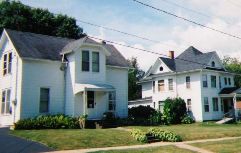
In early 1996, David was diagnosed with hepatitis C and started getting weak. He continued fighting the disease, and bought their first house in Platteville, Wisconsin, in 1998. He created a garden that kept growing every year. He had a green thumb, and he constantly found pleasure in sharing produce and flowers from his garden with everybody.
In early 2001, David had renal failure that resembled a heart attack, and he had to be put on dialysis. Despite getting weaker every day, he continued to work hard. He bought his second house, for rentals, in 2003. He still had it in him - A diehard landlord!
David's garden started getting smaller as his energy waned, but he continued to enjoy company and his family, making them laugh. He traveled to Europe in 2005 and visited many of his friends around the US, despite the need for dialysis during each trip.
David's garden started getting smaller as his energy waned, but he continued to enjoy company and his family, making them laugh. He traveled to Europe in 2005 and visited many of his friends around the US, despite the need for dialysis during each trip.
In 2005, David was given an opportunity to apply for liver and kidney transplants. The University of Chicago Hospital was the only place that had the capabilities to deal with his multiple medical problems. After a lot of paperwork, discussions and thought, and his failing condition, David concluded that the transplant was his opportunity for a better future, even though he knew there was only a 50% chance of success.
David never complained. He preferred to suffer quietly rather than have people pity or feel sorry for him. It was always about other people and never about him. He made an effort to make sure people could not see or hear the pain in his voice. He was a pleasant man to the end.
David never complained. He preferred to suffer quietly rather than have people pity or feel sorry for him. It was always about other people and never about him. He made an effort to make sure people could not see or hear the pain in his voice. He was a pleasant man to the end.
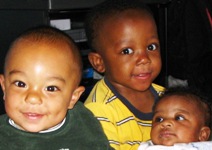
In the meantime, he became a grandfather three times. He was proud of his family. He was proud of who his children had become, and he always talked about how lucky he was to have wonderful son-in-laws.
He saw the good in and loved everybody and enjoyed anytime he had family and friends around him eating, dancing, joking, and laughing.
He saw the good in and loved everybody and enjoyed anytime he had family and friends around him eating, dancing, joking, and laughing.
The day he had been waiting for finally came in May 2007, and he went into surgery with hope to come out feeling much better than he had been. He was planning on visiting all the friends he had not been able to visit, but he also knew that this might be the end. He was ready - his sister Mary, whom he felt responsible for, had passed away; he had paid off both his houses; Rita would be fine; his kids were successful; and he had seen his third grandchild.
He quickly won over the doctors before surgery, he joked with them all the way to the surgery room. They particularly wanted this wonderful person to make it through the surgery.
The surgeons noticed how bad his liver condition had been and could not understand how he had been living and been active with a liver in this condition. His body was too weak and could not handle the new organs. It was time — his job in this world had been completed. He died quietly, surrounded by his family on the evening of May 28, 2007.
David, Umusaza, Ikaci, Muzehe, Papa, Grandpapa is missed by thousands of people and was a real gift to modern society. He was open minded, adventurous, crazy, adaptable, smart, funny, hard working, genuine, honest, and very loving.
He went into surgery with an open mind, hope, love, and laughter; and we are certain he was greeted with no pain and with love, joy and great reward for a job well done.
He quickly won over the doctors before surgery, he joked with them all the way to the surgery room. They particularly wanted this wonderful person to make it through the surgery.
The surgeons noticed how bad his liver condition had been and could not understand how he had been living and been active with a liver in this condition. His body was too weak and could not handle the new organs. It was time — his job in this world had been completed. He died quietly, surrounded by his family on the evening of May 28, 2007.
David, Umusaza, Ikaci, Muzehe, Papa, Grandpapa is missed by thousands of people and was a real gift to modern society. He was open minded, adventurous, crazy, adaptable, smart, funny, hard working, genuine, honest, and very loving.
He went into surgery with an open mind, hope, love, and laughter; and we are certain he was greeted with no pain and with love, joy and great reward for a job well done.